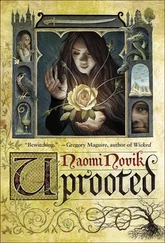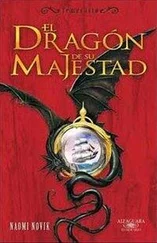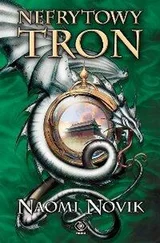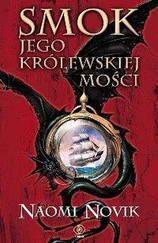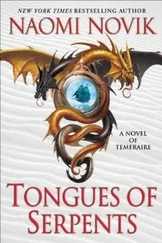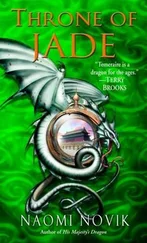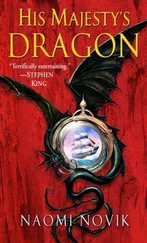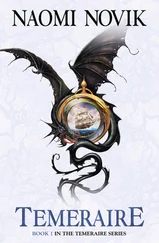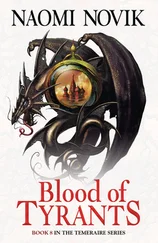Lien burst through the cloud and tried to come after them, even through the rain of hot iron, but the little French couriers shrilled, protesting; some threw themselves on her back, clinging, to try and drag her out of range. She shook them all off with a great heave, and would have pressed on, but one more, crying out, flung himself before her with desperate courage: his hot black blood was flung spattering upon her breast as the shot which would have struck her tore instead through his shoulder, and she halted at last, her battle-fury broken, to catch him up when he would have fallen from the sky.
She withdrew then with the rest of her anxious escort of couriers; but hovering out of range over the snow-driven shore, she voiced one final longing and savage cry of disappointment, as loud as if she might crack the sky. It chased Temeraire out of the harbor and beyond, leaving a ghost of itself still ringing in their ears, but the sky ahead was opening up to a fierce deep cloudless blue, an endless road of wind and water before them.
A signal was flying from the mast of the Vanguard. “Fair wind, sir,” Turner said, as they passed the ships by. Laurence leaned into the cold sea-wind, bright and biting; it scrubbed into the hollows of Temeraire’s sides to clean away the last of the pooled eddies of smoke, spilling away in grey trailers behind them. Riggs had given the riflemen the order to hold their fire, and Dunne and Hackley were already calling habitual insults to each other as they sponged out their barrels and put their powder-horns away.
It would be a long road still; as much as a week’s flying, with this contrary wind in their faces and so many smaller dragons to keep in company; but to Laurence it seemed he already beheld the rough stone coast of Scotland, heather gone brown and purplish-sere and the mountains mottled with white, past the green hills. A great hunger filled him for those hills, those mountains, thrusting up sharp and imperious, the broad yellowing squares of harvested farmland and the sheep grown fat and woolly for winter; the thickets of pine and ash in the coverts, standing close around Temeraire’s clearing.
Out ahead of them, Arkady began something very like a marching-song, chanting lines answered by the other ferals, their voices ringing out across the sky each to each; Temeraire added his own to the chorus, and little Iskierka began to scrabble at his neck, demanding, “What are they saying? What does it mean?”
“We are flying home,” Temeraire said, translating. “We are all flying home.”
Extracts from a letter published in the
Philosophical Transactions of the Royal Society ,
April 1806
March 3, 1806
Gentlemen of the Royal Society:
It is with trepidation that I take up my pen to address this august body regarding Sir Edward Howe’s recent discourse upon the subject of draconic aptitude for mathematics. For an amateur of so little distinction as myself to make reply to so illustrious an authority must smack of vainglory, and I tremble at the notion of offering offense to that gentleman or his many and justly deserved supporters. Only the sincerest belief in the merits of my case, and, beyond this, a grave concern for the deeply flawed course upon which the study of dragons seems bent, would suffice to overcome the natural scruple I must feel at setting myself in opposition to the judgment of one whose experience so greatly outstrips my own, and to whom I would show unhesitating deference, if not for evidence I must consider irrefutable; which, after much anxiety, I herein submit to the consideration of this body. My qualifications for this work are by no means substantial, my time for the pursuit of natural history being sadly curtailed by the demands of my parish, so if I am to persuade it must be with the force of my argument alone, and not through influence or impressive references….
By no means do I intend any disparagement of those noble creatures under discussion, nor to quarrel with any man who would call them admirable; their virtues are manifest, and among the highest of these the essential good-humour of their nature, evident in their submitting to the guidance of mankind for the sake of affection, rather than through a compulsion it were quite impossible for any man to bring to bear upon them. In this they have shown themselves very like that more familiar and most amiable creature the dog, who will shun the company of his own kind and cleave in preference unto his master, thus displaying almost alone among the beasts a discrimination for the society of his betters. This same discrimination dragons show, greatly to their credit, and certainly no one can deny that with it is matched an understanding superior to virtually all of the animal world that renders them arguably the most valuable and useful of all our domestic beasts….
And yet it has been some years now since many eminent gentlemen, unsatisfied with these considerable encomiums, have begun to put before the world, cautiously and in measured stages, a body of work which in its sum total, almost as if by joint intention, leads the thinking man to the inevitable and seductive conclusion that dragons rise beyond the animal sphere entirely: that they possess, in full measure equal to man, the faculty of reason and intellect. The implications of such an idea I scarcely need enumerate….
The foremost argument of these scholars to date has been that dragons alone among the beasts possess language, and show in their speech to the observer all the attributes of feeling and free will. Yet this argument I cannot allow even to be persuasive, much the less conclusive. The parrot, too, has mastered all the tongues of men; dogs and horses may be trained to comprehend some scattered words: if the latter possessed the facile throats of the former, would they not speak to us also, and solicit of us greater attentions? And as for these other arguments, who that has heard a dog whine, left behind by his master, would deny that animals know affection, and who that has set a horse at a fence and had it refused would deny that beasts possess their own—and often lamentably contrary!—will. Apart from these examples drawn from the animal kingdom, we have further seen in the famous work of Baron von Kempelen and M. de Vaucanson that the most astonishing automata may be produced, from a little tin and copper, which may produce speech through the operation of a few levers, or even mimic intelligent motion and persuade the uninformed observer of a lifelike animation, though they are nothing but clockwork and gears. Let us not mistake these simulacra of intelligence in brutish or mechanical behavior for true reason, the province only of man….
Once we have set these aside as insufficient proofs of draconic intelligence, we come to Sir Edward Howe’s most recent essay, which puts forth an argument not so easily dismissed: the ability of dragons to perform advanced mathematical calculations, an achievement which eludes many an otherwise educated man and is not to be found anywhere in the animal world, nor imitated by machinery. However, upon closer examination, we discover that…these feats we are to accept, upon the scantiest of evidence—the testimony of the dragon’s captain and his officers, his fond and affectionate companions, affirmed by Sir Edward Howe only through one examination made personally, over the course of a few hours. This may seem sufficient to some number of my readers, the essay made more plausible by its less-ambitious forerunners in the field. However, permit me to point out that a similarly fragile body of evidence serves as the foundation of many of these earlier works as well….
My audience may justly demand to know why such a claim might be pressed, intentionally or no; without making any accusation, I will for the satisfaction of this demand speculate not upon the actual, but upon plausible motives, though only considering those which may be called disinterested. I trust that these are sufficient to allay any suspicion that I mean to suggest any sordid conspiracy, for nothing could be further from my mind. It is natural that the huntsman should love his hounds and see in their brute devotions a human affection, that he should read into the tenor of their barks and the gleam of their eyes a deeper communication; it is the huntsman’s own sensitivity which makes truth of this illusion, and makes him all the better a custodian of his flock. That the officers of the Aerial Corps have a communication of this sort with their dragons I do not doubt; but this must be laid to the credit of the men and not the beasts, even if the men deny the credit of it in all sincerity…. Furthermore, all those who have affection for these noble creatures must desire the improvement of their condition, and an acknowledgment of, as it were, the humanity of these beasts, must surely oblige us to deal with them more kindly than heretofore, which cannot be called anything but a generous motive….
Читать дальше

